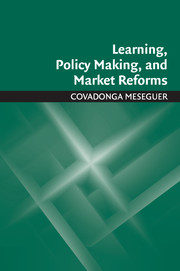2 - The Model
Published online by Cambridge University Press: 18 January 2010
Summary
[P]eople ought to learn from their mistakes.
Dani Rodrik (1996: 23)Imagine the following situation. A new government headed by Alberto Monge Alvárez of the National Liberation Party (Partido de Liberación Nacional, PLN) is elected in Costa Rica in mid-1982. The government considers reducing quotas and tariffs, and eliminating subsidies that encourage import substitution. The economic team, however, is concerned about the impact that liberalizing the trade regime will have on Costa Rican rates of growth. It is very likely that the team, led by the central bank governor Carlos Manuel Castillo, has some established beliefs about the consequences of liberalizing based on either economic theory or previous experience. Despite these “informed hunches,” there is some uncertainty about the economic consequences of liberalizing.
One simple way to reduce the uncertainty is to compare the experience of countries that chose to liberalize their trade regime in the past with that of those that opted to continue under a protectionist development model. Which of the two models performed better? To answer this question, the dedicated economic team gathers the relevant information. Again, imagine that the evidence is overwhelming: Not only did the countries that opened up their trade regimes grow more on average, but all of them grew more. By contrast, the data on the countries that opted for a protectionist trade regime was “confusing”: On average, they grew less than those that opened up their trade regimes.
- Type
- Chapter
- Information
- Learning, Policy Making, and Market Reforms , pp. 37 - 72Publisher: Cambridge University PressPrint publication year: 2009



